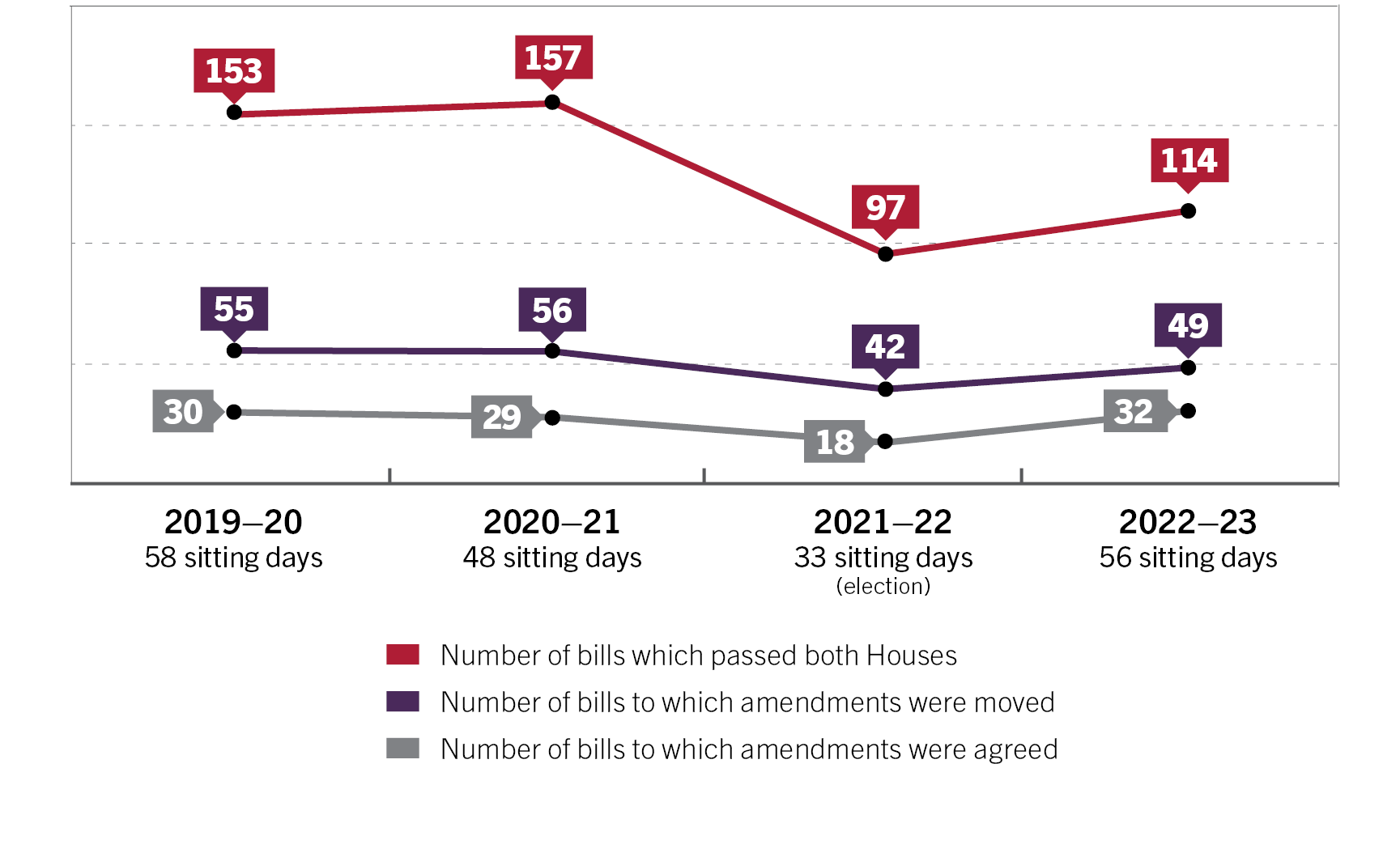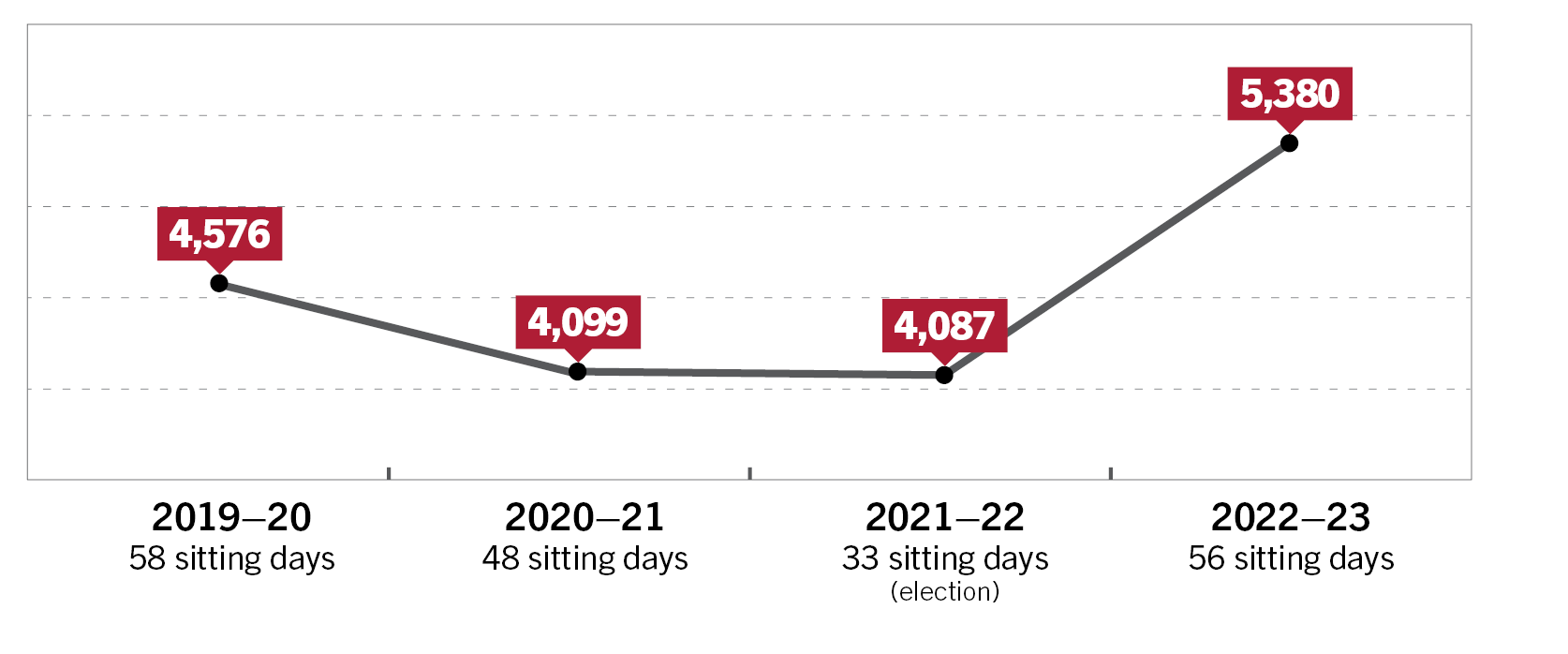| Outputs |
Programming and procedural support to the Senate and the legislative process.
Publication of formal and informal records of Senate business.
Receipt, dissemination and storage of documents.
Secretariat support for the Publications; Selection of Bills; and Senators' Interests committees. |
Procedural advice and legislative documents are accurate and timely. |
Advice was given as required. Legislative documents were accurate and produced within required timeframes. |
Order of Business, Notice Paper and Senate Journals are accurate and published within required timeframes.
Other publications are accurate and timely. |
All information resources were accurate and published according to required timeframes. |
Tabled documents are processed and stored, and available online wherever possible. |
Senate records were accurately recorded and safely stored and documents were distributed in a timely manner. |
Committees are supported; advice, documentation, publications and draft reports are accurate and timely. |
Committee meetings were held, documents provided and reports prepared within agreed timeframes. |
Overview
The Table Office is led by the Clerk Assistant (Table) and has three functional areas, as shown in figure 6.
Figure 6 – Elements and responsibilities of the Table Office
| Executive and programming |
Procedural advice to government senators, programming support and production of the Order of Business.
Secretary to the Selection of Bills and Senators' Interests committees, and Registrar of Senators' Interests. |
Processing legislation
Processing and custody of documents
Inquiries services
Secretary to the Publications Committee
Records management |
Production of the Notice Paper and Senate Journals
Processing questions on notice, orders for the production of documents and petitions |
The Table Office provided support for the Senate on each of its 56 sitting days in this reporting period – a considerable increase on the 33 sitting days last year which was consistent with the number in an election year. All performance results, as outlined in the table on page 35, were achieved within established timeframes. Project work was completed or has continued, as forecast.
Much of the work of the Table Office involves direct contact with senators and their staff, as well as other clients. This presents an ongoing opportunity to receive and respond to feedback about the services provided by the office. Feedback was generally positive. Senators and their staff were surveyed in March 2023 about their satisfaction with services provided by the Table Office. Thirty three responses were received (15 senators and 18 staff) all of which noted that the service was good or excellent. Staff numbers remained steady during the reporting period, with an average full-time equivalent level of 14.1. The cost of the office was $2.1m ($2.1m in 2021–22).
Programming and procedural support
The Table Office supported the operation of the Senate by providing programming support, preparing procedural scripts for use in the chamber (1,169 in 2022–23, averaging 21 per sitting day) and providing a broadcast captioning service of Senate proceedings. The Order of Business (the program for each day's sitting) was prepared in draft form to assist senators (especially the whips) and published as a final edition prior to each sitting. The Clerk Assistant (Table) and other staff of the office provided procedural advice to government office holders in relation to programming and the management of government business in the Senate, and also worked closely with the Parliamentary Liaison Officer (Department of the Prime Minister and Cabinet) to facilitate government business in the Senate.
Formal records
The Notice Paper is the formal agenda of the Senate. The Notice Paper was produced and published by the Table Office in advance of each sitting day (apart from the opening of Parliament). The Senate Journals is the official record of decisions made by the Senate. Proof Senate Journals were published online shortly after the end of each sitting day, and printed versions distributed the next morning. Final Senate Journals were subsequently produced following thorough checking of source materials.
Legislation
The office facilitated the legislative work of the Parliament by processing all bills considered in the Senate, preparing legislative documents including third reading and assent prints of bills passed, and processing assent messages.
The office also prepared the formal messages by which the two Houses communicate on legislative and other activity. In 2022–23, 156 messages were prepared, of which 116 related to the passage of bills (the remaining related to matters such as committee memberships). These figures compare to 101 messages, of which 89 related to the passage of bills, in 2021–22. Figure 7 reflects the level of legislative activity in recent years.
Figure 7 – Senate legislative activity, 2019–20 to 2022–23

Questions on notice, notices of motion and petitions
Senators continued to use the questions on notice process – written questions to ministers on the administration of public policy – as an important accountability mechanism. Throughout the reporting period, 2,232 questions were asked on notice. These were processed and published to a searchable database on the Parliament's website within established timeframes.
In 2022–23, the office processed all notices of motion received for inclusion in the Notice Paper – 386 for this reporting period compared to 254 in the previous period. These notices signal senators' intentions to move particular motions on specified days. The office also processed three petitions which senators had lodged for presentation to the Senate (compared to four petitions in 2021–22).
Another frequently used means of obtaining information about matters of concern to the Senate are orders for documents. During 2022–23, the office processed 105 orders for documents made by the Senate, compared to 51 in the previous year.
Documents
The office received and processed all of the 5,380 documents provided for tabling in the Senate in this reporting period, recorded their details in the Senate Journals and Index to the Papers Presented to Parliament, and archived them. This figure is a significant increase on the 4,087 documents tabled in the previous period. Figure 8 shows the number of documents tabled in the Senate in recent years.
All documents presented to the Senate in the reporting period were digitised and made publicly available on the Parliament's website, except for those documents already made available on the Federal Register of Legislation by the Office of Parliamentary Counsel.
Significant work continues to be undertaken to organise and rationalise the office's holdings of hard copy materials to ensure the preservation of historically important material and the efficient use of the office's document storage areas. A new website to facilitate the receipt and publication of documents electronically was also implemented.
Figure 8 – Documents tabled in the Senate, 2019–20 to 2022–23

Support for committees
During the year, the office provided secretariat support to three committees. All committee meetings were convened, papers prepared (including draft reports as required) and other administrative support provided within the timeframes required by the committees.
The Clerk Assistant (Table) is secretary to the Selection of Bills Committee which meets and reports each sitting week on recommendations to refer bills to the legislation committees for inquiry. He is also secretary to the Senators' Interests Committee and is the Registrar of Senators' Interests, with responsibility for, among other things, administering the Register of Senators' Interests and the Register of Senators' Qualifications, both of which are published online.
In addition, the Director of the Table Office provided secretariat support to the Senate Publications Committee.
Performance outlook
In 2023–24, the Table Office will continue to serve as the secretariat to the Senate, and to certain committees.
The existing timeframes set for the provision of various services remain appropriate, with a few minor adjustments reflected in the office's 2023–24 work plan. The office will continue to monitor its performance through the collation of a range of statistics and feedback and exception-based reporting of non-compliance.
The key procedural publications – Order of Business, Notice Paper and Senate Journals – produced by the office will continue to be refreshed to reflect the evolving style of Senate and departmental documents, and a continued emphasis on publishing procedural material in digital formats to support accessibility and efficiency and to reduce printing costs.
The office will also continue to support various ICT related activities, including contributing to the ongoing maintenance, enhancement and testing of existing systems that support the work of the office and the Senate. The recent completion of a new system to facilitate the receipt and publication of tabled documents in digital format promises significant efficiencies. The key staffing focus for the next reporting period remains the sharing of skills and knowledge to ensure sufficient back-up is available to fill in for staff who are on leave, as well as bringing in staff from other areas of the department from time-to-time, to ensure that expertise in relation to specific tasks is not unduly concentrated.